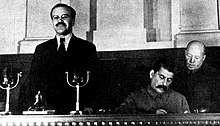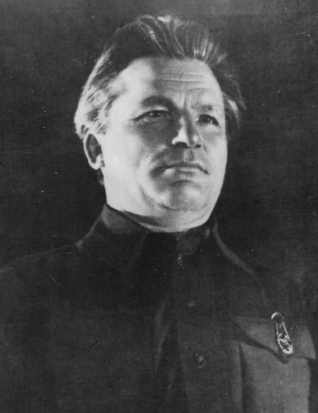
Sergei Mironovich Kirov was a Russian and Soviet politician and Bolshevik revolutionary. Kirov was an early revolutionary in the Russian Empire and a member of the Bolshevik faction of the Russian Social Democratic Labour Party. Kirov became an Old Bolshevik and personal friend to Joseph Stalin, rising through the Communist Party of the Soviet Union ranks to become head of the party in Leningrad and a member of the Politburo.

Andrei Aleksandrovich Zhdanov was a Soviet politician. He was the Soviet Union's "propagandist-in-chief" after the Second World War, and was responsible for developing the Soviet cultural policy, the Zhdanov Doctrine, which remained in effect until the death of Joseph Stalin. Zhdanov was considered Stalin's most likely successor but died before him.
The history of the Communist Party of the Soviet Union was generally perceived as covering that of the Bolshevik faction of the Russian Social Democratic Labour Party from which it evolved. In 1912, the party formally split, and the predecessor to the Communist Party of the Soviet Union became a distinct entity. Its history since then can roughly be divided into the following periods:
The Ryutin affair was an attempt led by Martemyan Ryutin to remove Joseph Stalin as General Secretary of the All-Union Communist Party (b) (CPSU) in 1932.
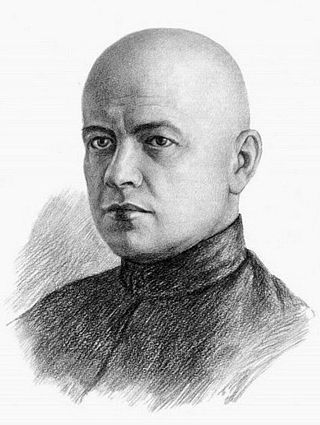
Stanisław Vikentyevich Kosior, sometimes spelled Kossior, was a Soviet politician who was First Secretary of the Communist Party of Ukraine, Deputy Premier of the Soviet Union and member of the Politburo of the Communist Party of the Soviet Union (CPSU). He and his wife were both executed during the Great Purge.

Avel Safronovich Yenukidze was a prominent Georgian Old Bolshevik and, at one point, a member of the Central Committee of the All-Union Communist Party (b) in Moscow. In 1932, along with Mikhail Kalinin and Vyacheslav Molotov, Yenukidze cosigned the infamous "Law of Spikelets". In 1918 to 1935 Yenukidze served as the Secretary of the All-Russian Central Executive Committee and the Central Executive Committee of the Soviet Union.
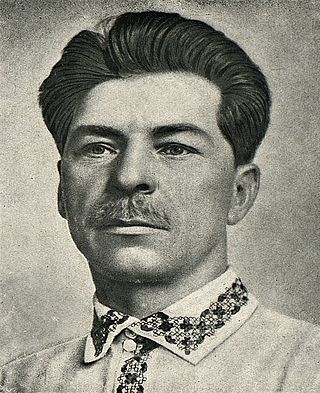
Pavel Petrovich Postyshev was a Soviet politician, state and Communist Party official and party publicist. He was a member of Joseph Stalin's inner circle, before falling victim to the Great Purge.

Andrey Andreyevich Andreyev was a Soviet Communist politician. An Old Bolshevik who rose to power during the rule of Joseph Stalin, joining the Politburo as a candidate member in 1926 and as a full member in 1932, Andreyev also headed the powerful Central Control Commission of the Communist Party of the Soviet Union from 1930 to 1931, and then again from 1939 until 1952.
The 16th Congress of the Russian Communist Party (Bolsheviks) was held during 26 June - 13 July 1930 in Moscow. The congress of the Russian Communist Party (Bolsheviks) was attended by 1,268 voting delegates and 891 delegates with observer status. It elected the 16th Central Committee.
The 18th Congress of the Russian Communist Party (Bolsheviks) was held during 10–21 March 1939 in Moscow. It elected the 18th Central Committee.

Alexander Nikolaevich Poskrebyshev was a Soviet politician and a state and Communist Party functionary. A member of the Communist Party of the Soviet Union since March 1917, he was chief of the special department of the Central Committee of the Communist Party.

Grigory Naumovich Kaminsky was a Soviet politician who was the 2nd First Secretary of Azerbaijan Communist Party, and one of founders of the health care system in the Soviet Union.
Purges of the Communist Party in the Soviet Union were Soviet political events, especially during the 1920s, in which periodic reviews of members of the Communist Party were conducted by other members and the security organs to get rid of "undesirables". Such reviews would start with a short autobiography from the reviewed person and then an interrogation of him or her by the purge commission, as well as by the attending audience. Although many people were victims of the purge throughout this decade, the general Soviet public was not aware of the purge until 1937.
On the Cult of Personality and Its Consequences, popularly known as the Secret Speech, was a report by Soviet leader Nikita Khrushchev, First Secretary of the Communist Party of the Soviet Union, made to the 20th Congress of the Communist Party of the Soviet Union on 25 February 1956. Khrushchev's speech was sharply critical of the rule of the deceased General Secretary and Premier Joseph Stalin, particularly with respect to the purges which had especially marked the last years of the 1930s. Khrushchev charged Stalin with having fostered a leadership cult of personality despite ostensibly maintaining support for the ideals of communism. The speech was leaked to the West by the Israeli intelligence agency Mossad, which received it from the Polish-Jewish journalist Wiktor Grajewski.
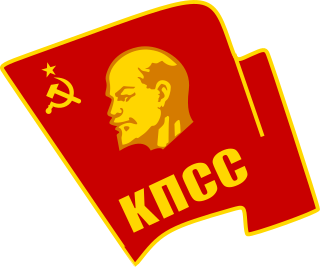
The Political Bureau of the Central Committee of the Communist Party of the Soviet Union, abbreviated Politbureau CC CPSS or simply Politbureau, was the highest political body of the Central Committee of the Communist Party of the Soviet Union and de facto a collective presidency of the USSR. It was founded in October 1917, and refounded in March 1919, at the 8th Congress of the Bolshevik Party. It was known as the Presidium from 1952 to 1966. The Politburo's authority was significantly undermined during the August coup and subsequently ended three months later upon its dissolution in 1991.

The Central Committee of the Communist Party of the Soviet Union was the highest organ of the Communist Party of the Soviet Union between two congresses. According to party statutes, the committee directed all party and governmental activities. The Party Congress elected its members.
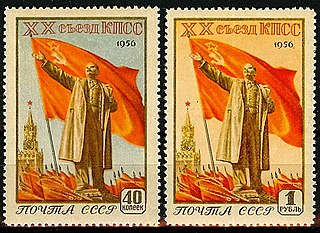
The 20th Congress of the Communist Party of the Soviet Union was held during the period 14–25 February 1956. It is known especially for First Secretary Nikita Khrushchev's "Secret Speech", which denounced the personality cult and dictatorship of Joseph Stalin.
The Nineteenth Congress of the Communist Party of the Soviet Union was held from 5 to 14 October 1952. It was the first party congress after World War II and the last under Joseph Stalin's leadership. It was attended by many dignitaries from foreign Communist parties, including Liu Shaoqi from China. At this Congress, Stalin gave the last public speech of his life. The 19th Central Committee was elected at the congress.

The Central Committee of the 17th Congress of the All-Union Communist Party (Bolsheviks) sat from 10 February 1934 until the convening of the 18th Congress on 10 March 1939. Its 1st Plenary Session elected the Politburo, Secretariat and Orgburo. The 17th Congress was labelled the "Congress of Victors" to mark the success of the first five-year plan and the collectivization of agriculture. The CC 1st Plenary Session elected Joseph Stalin General Secretary of the Central Committee, and Lazar Kaganovich continued to serve as Stalin's deputy, an informal post referred to by Sovietologists as Second Secretary, and was empowered to manage party business and sign Politburo resolutions when Stalin was away from Moscow.
Mikhail Semyonovich Chudov was a Russian revolutionary and Soviet politician. He and his wife were shot during the Great Purge.
